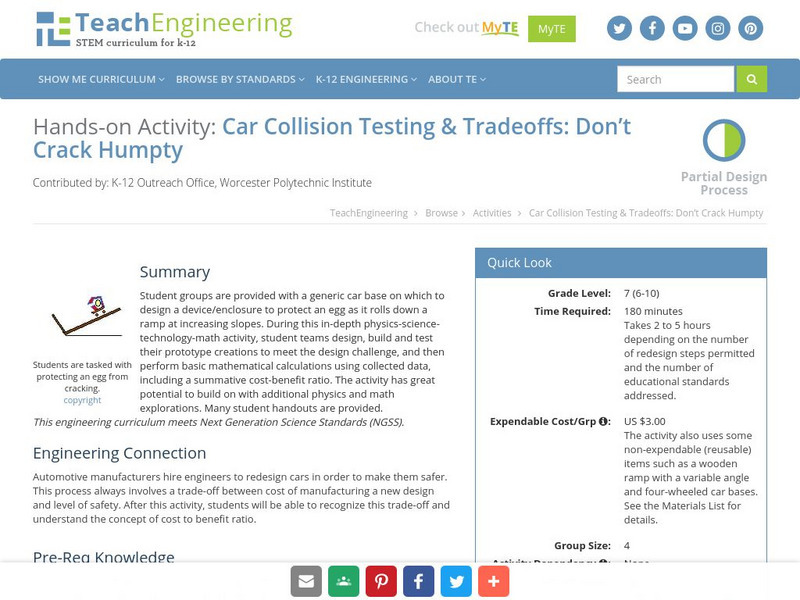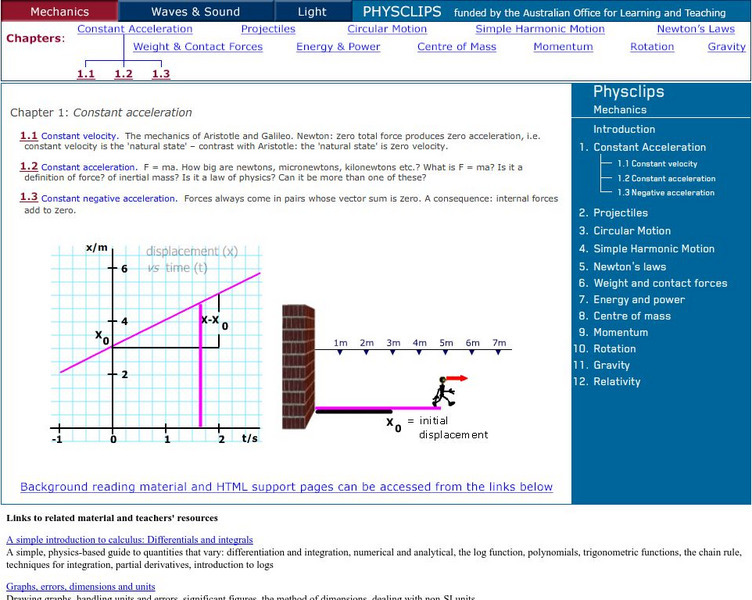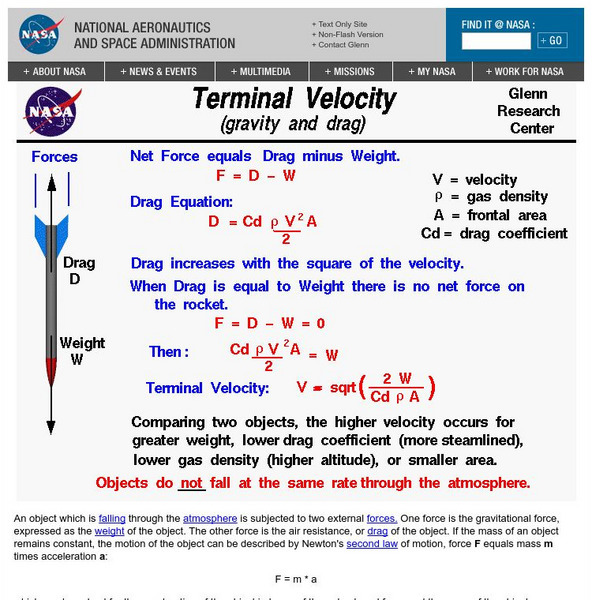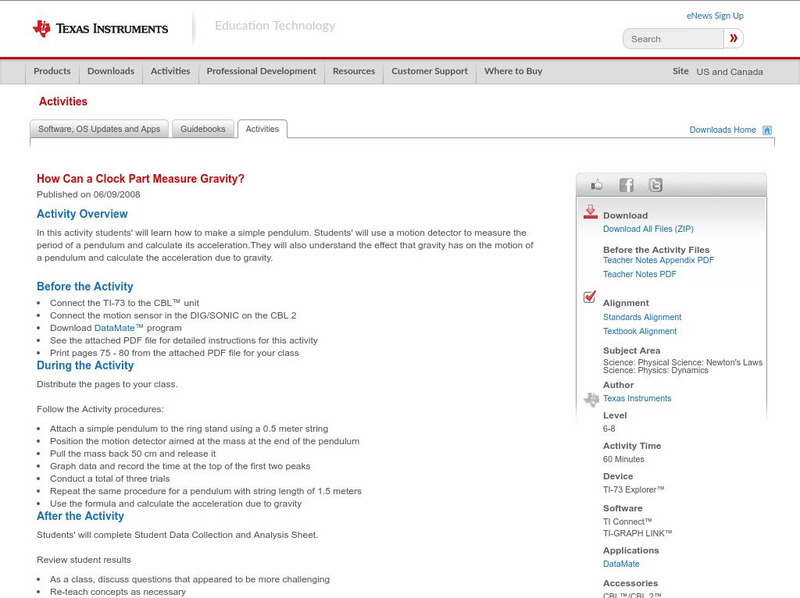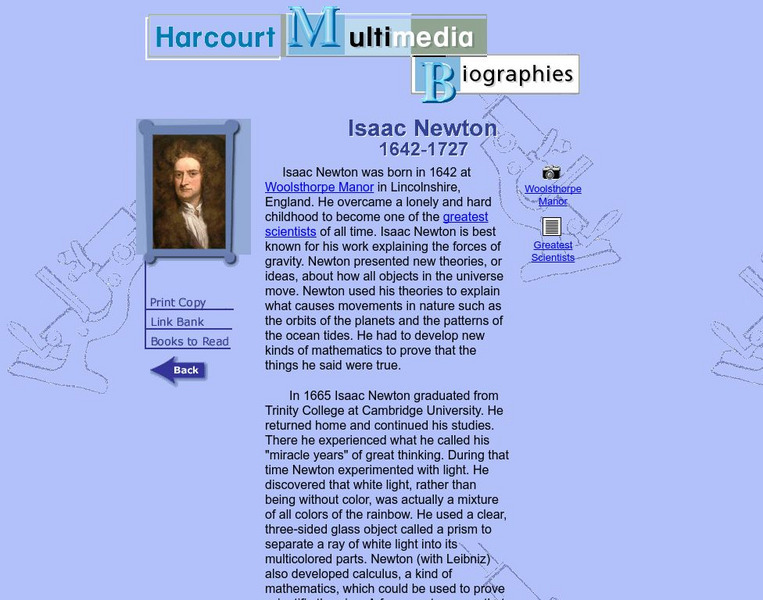Hi, what do you want to do?
TED Talks
Ted: Ted Ed: Would You Weigh Less in an Elevator?
Video that uses an elevator in motion to describe the relationship among weight, gravity, and relative motion. [3:36] Includes a short quiz and a list of additional resources to explore.
TeachEngineering
Teach Engineering: Sliding Textbooks
In this culminating activity of the unit which highlights how forces play a role in engineering design and material choices, students explore and apply their knowledge of forces, friction, acceleration, and gravity in a two-part experiment.
TeachEngineering
Teach Engineering: Car Collision Testing & Tradeoffs: Don't Crack Humpty
Student groups are provided with a generic car base on which to design a device/enclosure to protect an egg as it rolls down a ramp at increasing slopes. During this activity, student teams design, build and test their prototype...
University of St. Andrews (UK)
University of St. Andrews: Orbits and Gravitation
A page describing the physics, mathematics, and historical figures associated with planetary motion, satellite motion, and universal gravitation.
TeachEngineering
Teach Engineering: Mechanics Mania
Through ten lessons and numerous activities, students explore the natural universal rules engineers and physicists use to understand how things move and stay still. Together, these rules are called "mechanics." The study of mechanics is...
University of New South Wales (Australia)
University of New South Wales: School of Physics: Physclips
Physiclips thoroughly presents mechanics concepts with animations and film clips.
Cosmo Learning
Cosmo Learning: Fundamentals of Physics
A collection of video lectures from a fundamentals of physics course taught at Yale University. The course is an introduction to physics and discusses Newtonian mechanics, special relativity, gravity, thermodynamics, and waves. Course...
Upper Canada District School Board
Tom Stretton's Chemistry Pages: Universal Gravitation
Deepen your understanding about the Law of Universal Gravitation. Find out how the many scientists throughout history contributed to one of the most widely known scientific theories.
Wikimedia
Wikipedia: The Black Hole
This site examines the black hole as an object in astrophysics. Delve into this comprehensive resource that covers this concept from its history, to qualitative physics, the reality of black holes, mathematical physics and more.
Physics Classroom
The Physics Classroom: Satellite Motion
An animation depicting the path of projectiles launched at various launch speeds from the fictional Newton's Mountain. Accompanying text discusses satellite motion and the requirements of orbital motion. Links to further information is...
Science Bob Pflugfelder
Science Bob: The Lincoln High Dive
Instructions for a science demonstration of Newton's first law of motion using common supplies. Learn how to turn the demonstration into an experiment.
NASA
Nasa: Beginner's Guide to Aerodynamics
This site from NASA uses a colorful graphic to illustrate why objects reach terminal velocity. Provides equation for the terminal velocity of an object. Graphic is accompanied by a simple explanation.
University of Virginia
Uva Physics: Using Vectors to Describe Motion
Background information on vectors and their use in describing motion in two dimensions. A comparison of Aristotle's and Galileo's perspectives on force and motion is given.
Texas Instruments
Texas Instruments: How Can a Clock Part Measure Gravity?
In this activity students will learn how to make a simple pendulum. Students' will use a motion detector to measure the period of a pendulum and calculate its acceleration.They will also understand the effect that gravity has on the...
NASA
Nasa: Beginner's Guide to Aerodynamics
Includes exhaustive information and a wealth of activities pertaining to aerodynamics and the physics of flight.
Other
Wikibooks: Physics Study Guide
A handy resource that gives an overview of equations and definitions pertinent to an introductory, college-level physics course, with two of its three sections focusing on motion-related topics and principles.
University of St. Andrews (UK)
University of St. Andrews: Isaac Newton (1643 1727)
This life of Isaac Newton' traces his life from birth through childhood to his rise as a renown scientist and mathematician.
University of Minnesota
The Physics of Flight: Bernoulli's Principle
Discusses air flow around the wing of a plane and its effect upon the lift and drag forces. Focuses on the application of Bernoulli's principle to wing design and the subsequent airfoil shapes.
American Association of Physics Teachers
Com Padre Digital Library: Open Source Physics: Remarkable Three Body Motions
What happens in space when a third celestial body joins two others? Discover both simple and complex situations which occur supporting Newtonian law in space with this collection of applets.
American Association of Physics Teachers
Com Padre Digital Library: Open Source Physics: Newton's Mountain Model
A science simulation launches a projectile from the top of a mountain testing Newton's theory introduced in Principia.
Georgia State University
Georgia State University: Hyper Physics: Potential Energy
This site from Georgia State University Physics Department defines and explains the concept of potential energy. Using equations and graphics to illustrate the idea, it discusses the many types of potential energy (gravitational,...
Other
Bscs: Forces and Motion Content Background Document
In this document, we will try to answer a fundamental question of physical science, "Why do things start to move, slow down, speed up, stop moving or change direction?" In answering these core questions we can develop concepts that can...
Houghton Mifflin Harcourt
Harcourt: Biographies: Isaac Newton
A brief biography on scientist Isaac Newton, highlighting his discoveries and the book he published in 1687, "Principia", which was on his theories of gravity and laws of motion.
Bill Nye
Bill Nye: Falling for Science
Try this at-home science experiment to learn about acceleration due to gravity.
Other popular searches
- Newton Law of Gravity
- Newton's Law of Gravity
- Newtons Law of Gravity
- Universal Law of Gravity
- Law of Gravity Video
- The Law of Gravity







